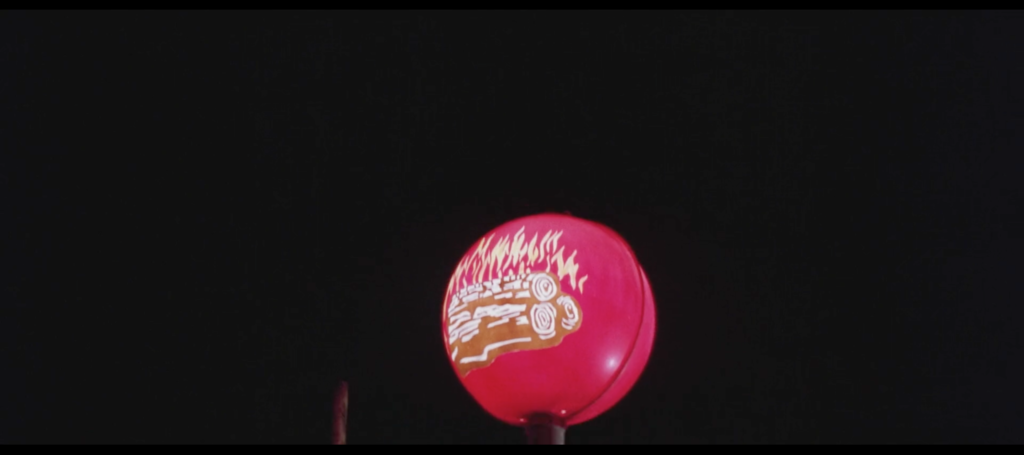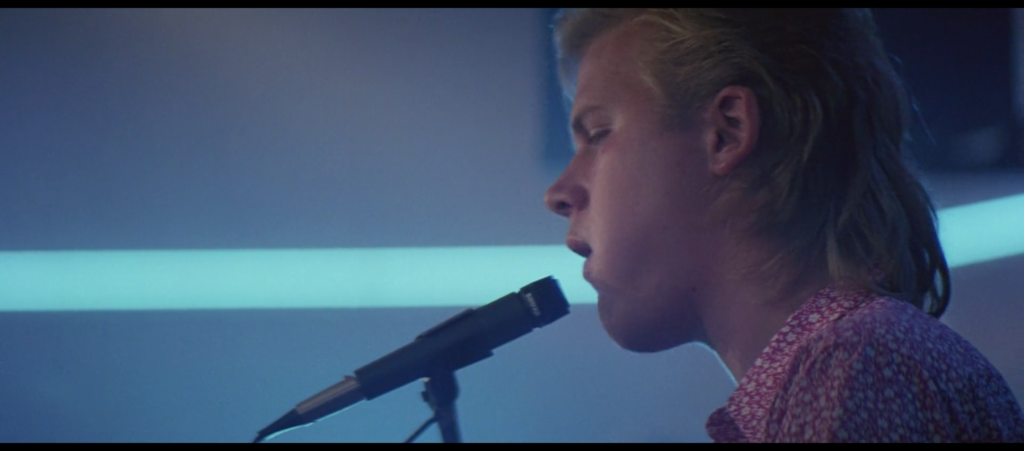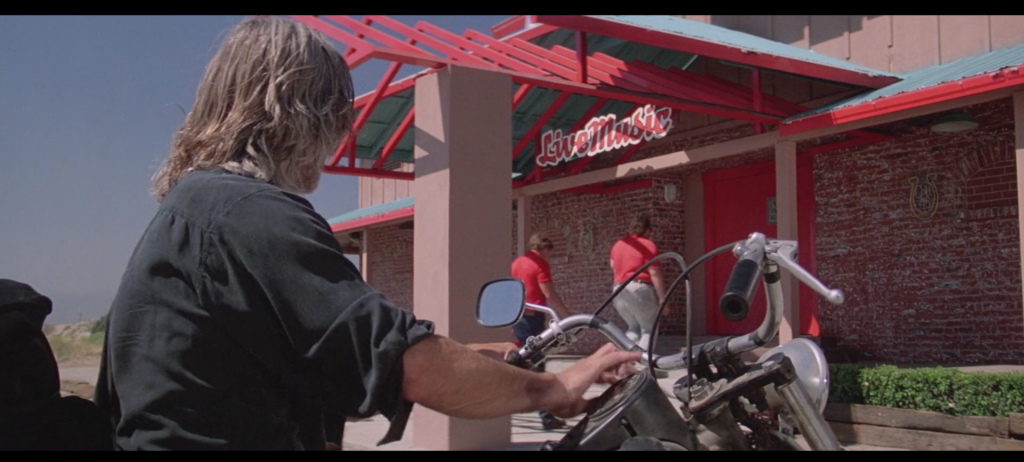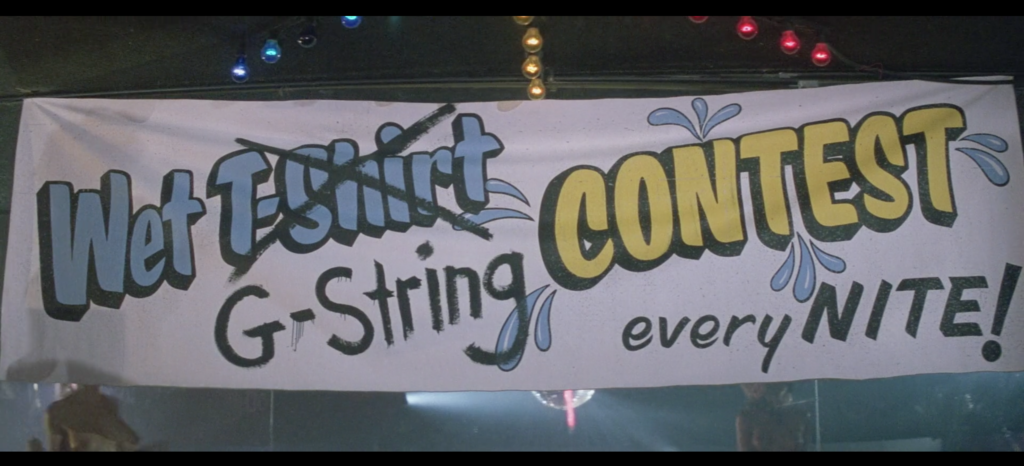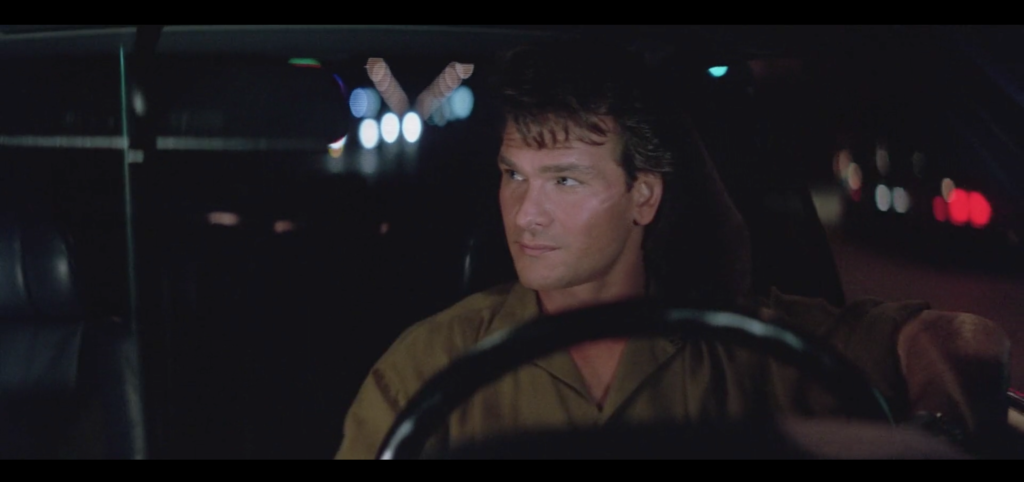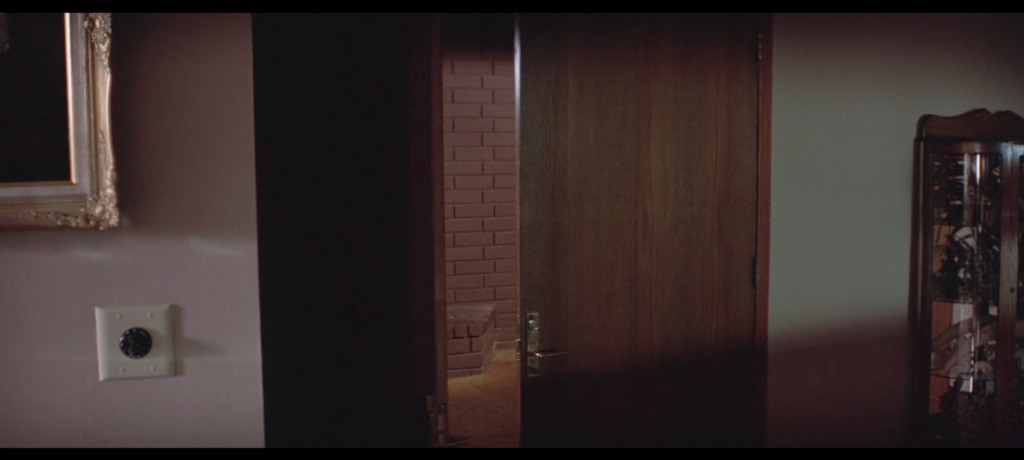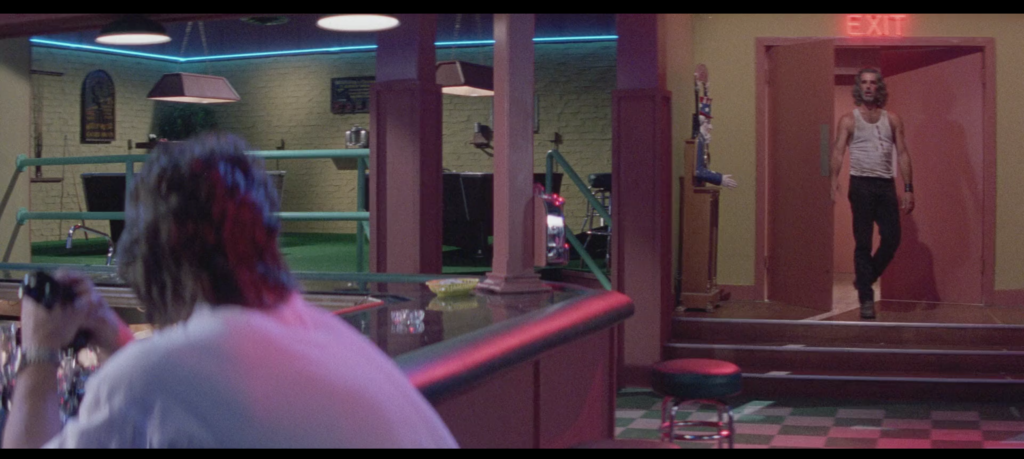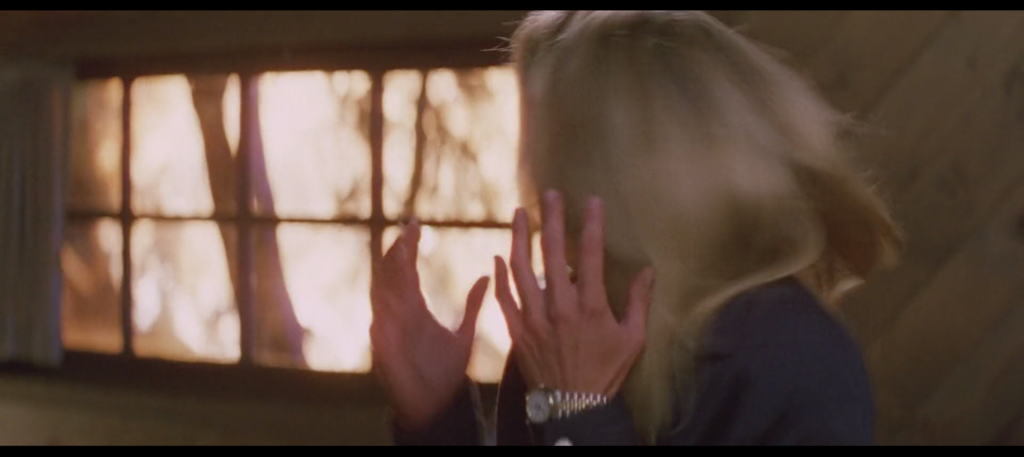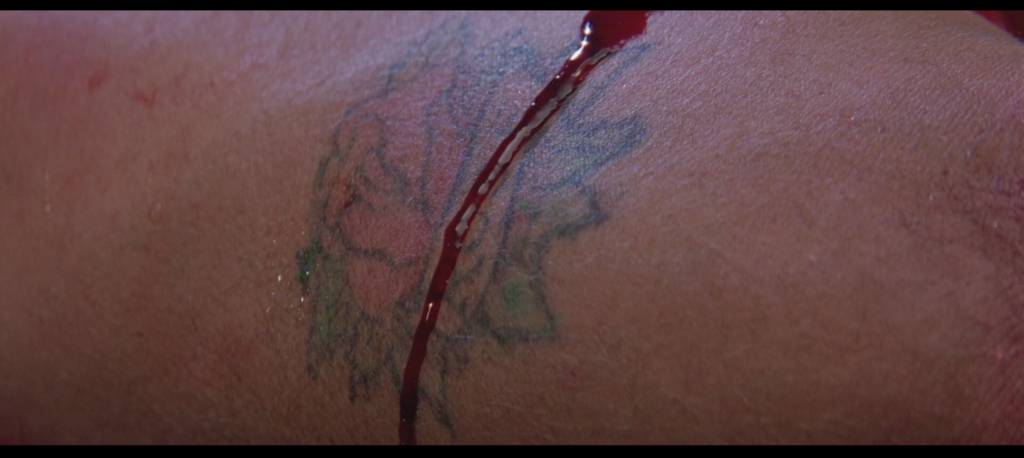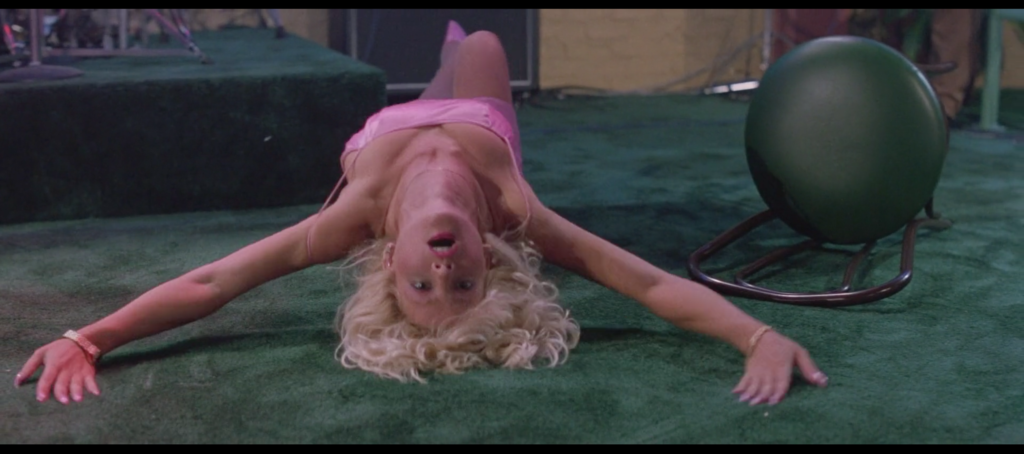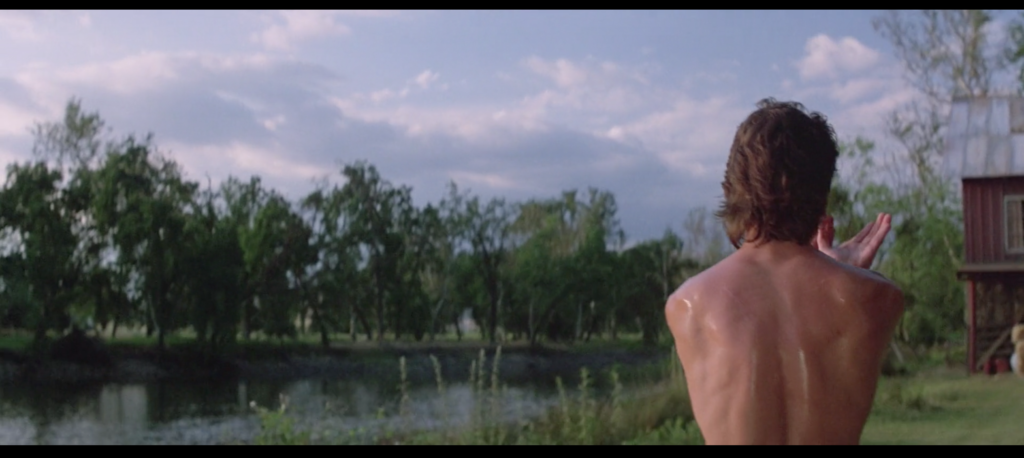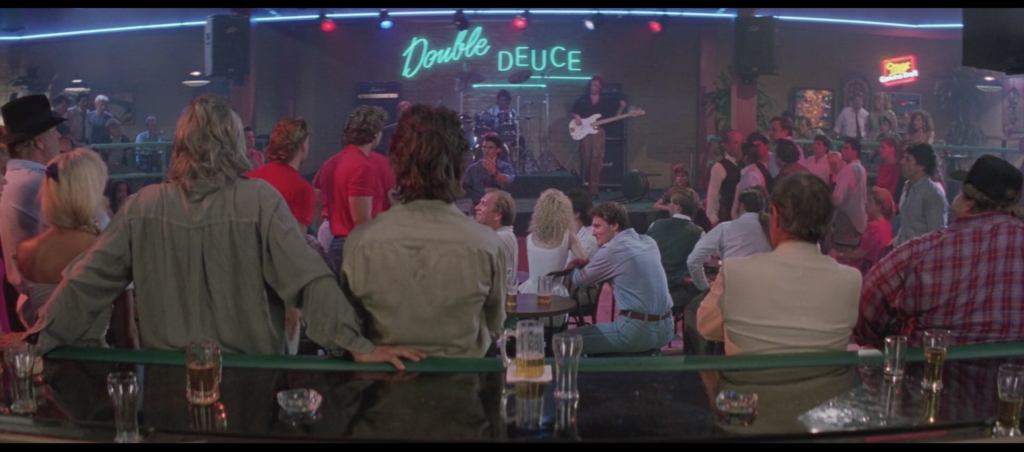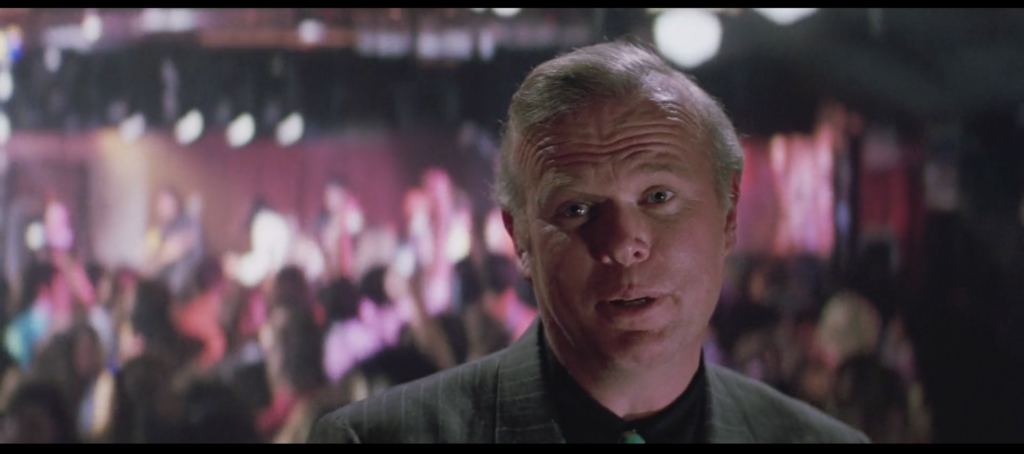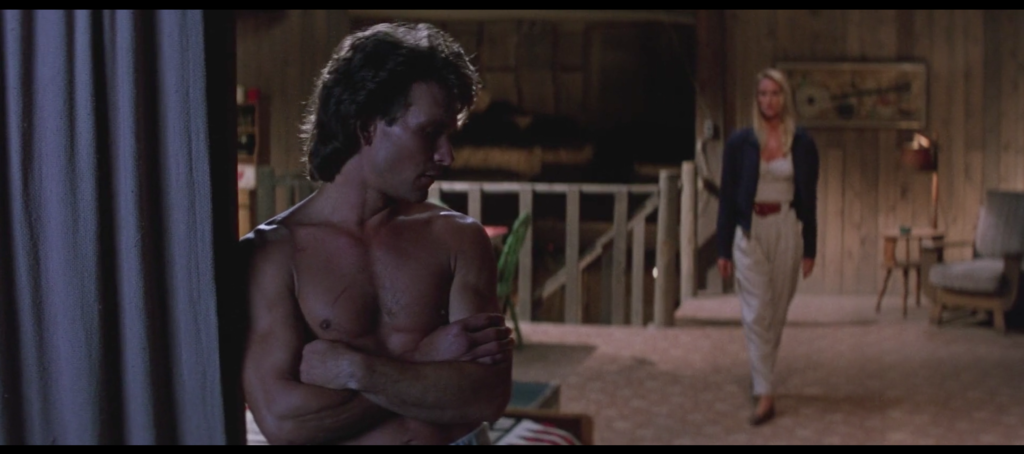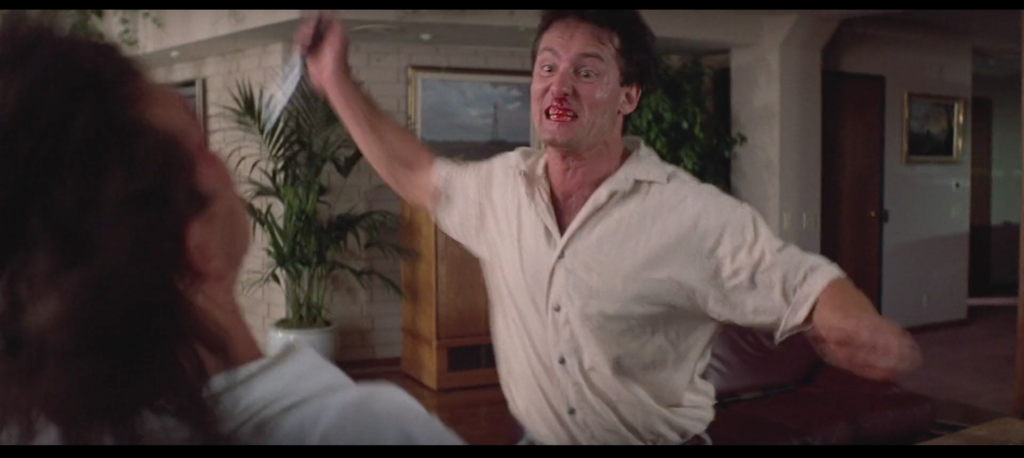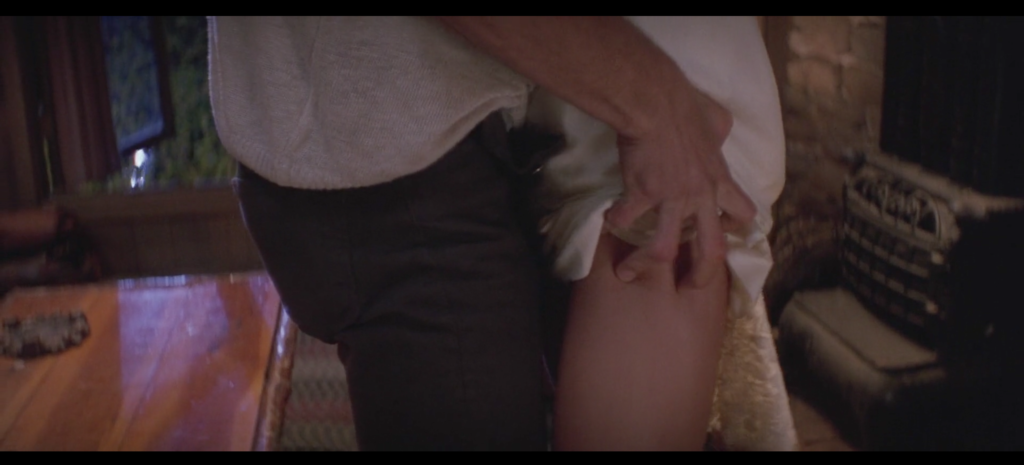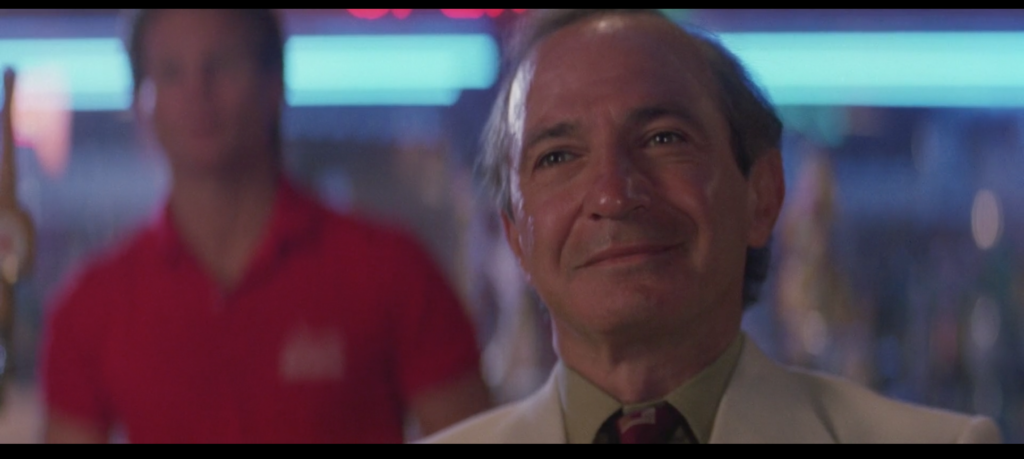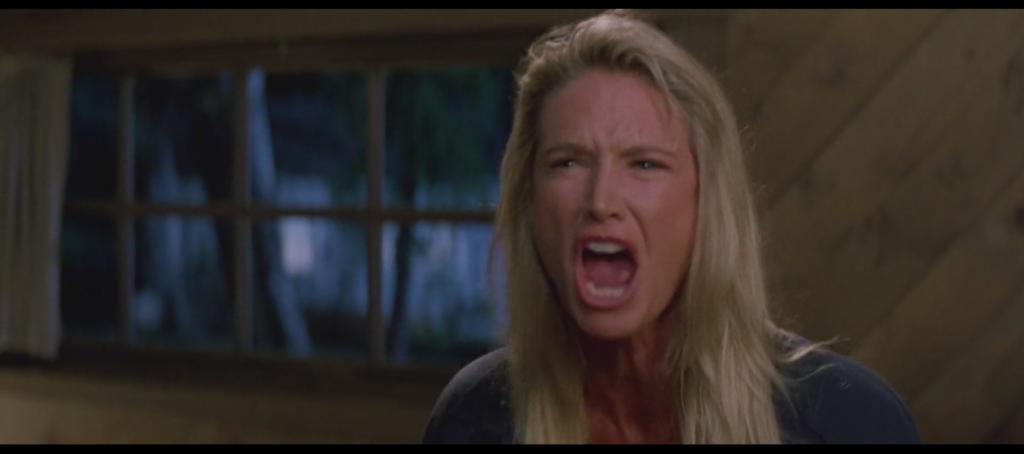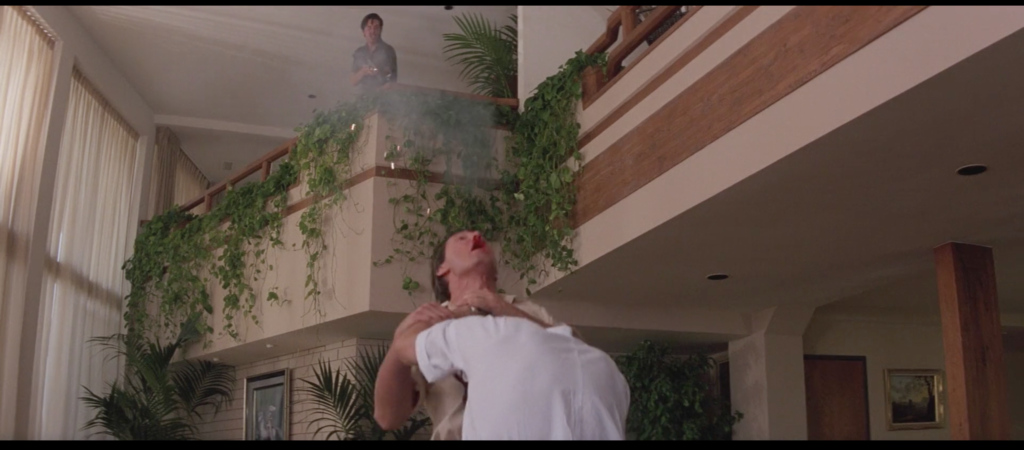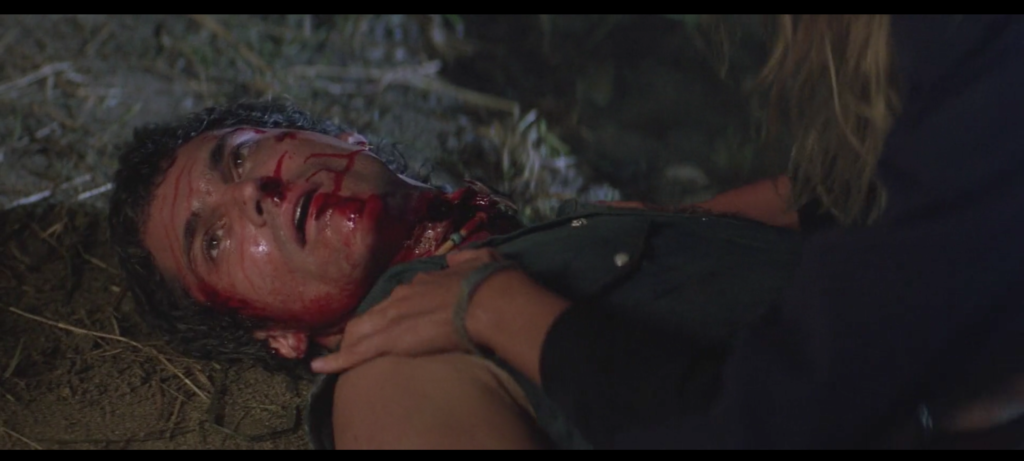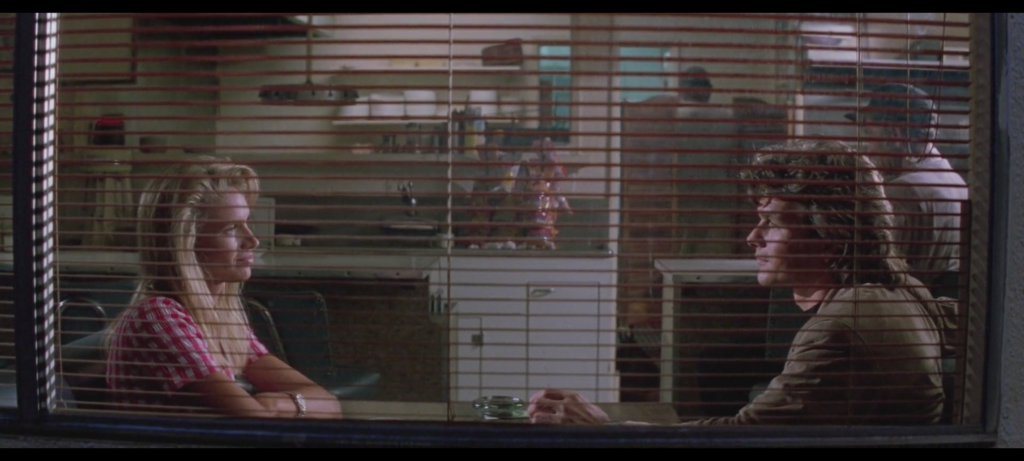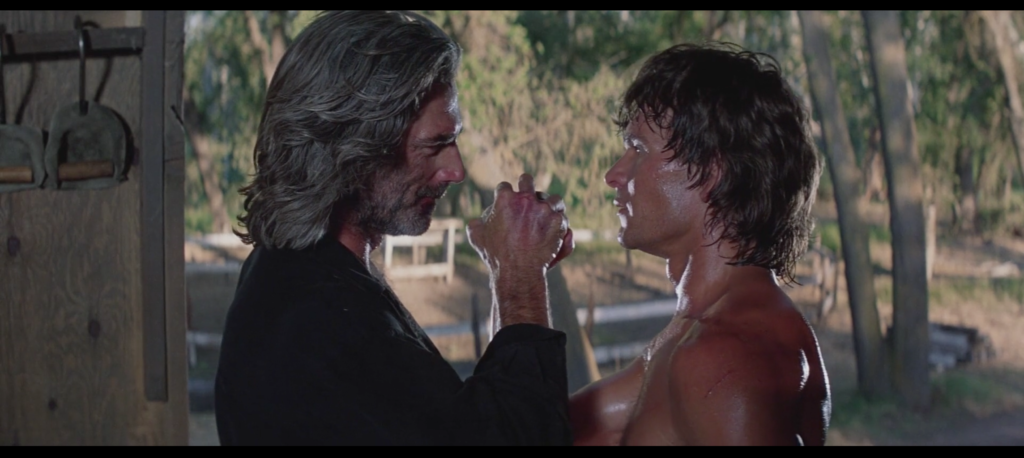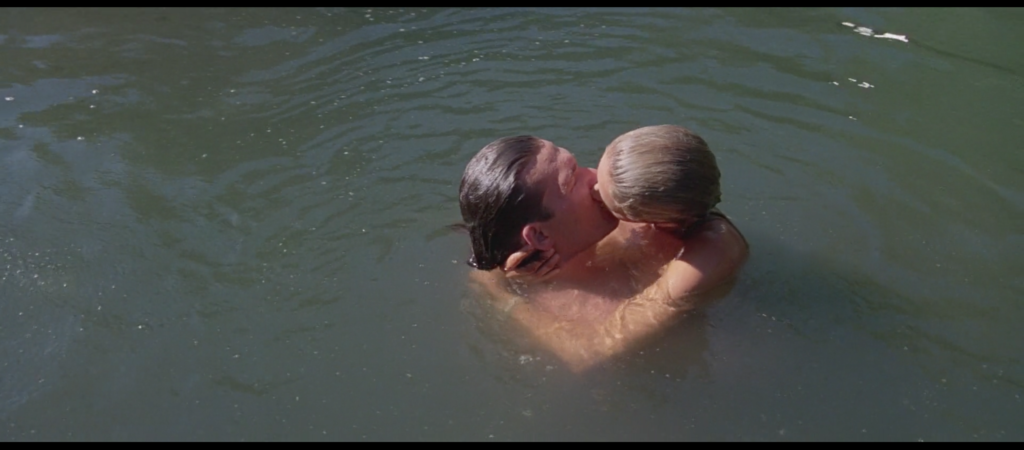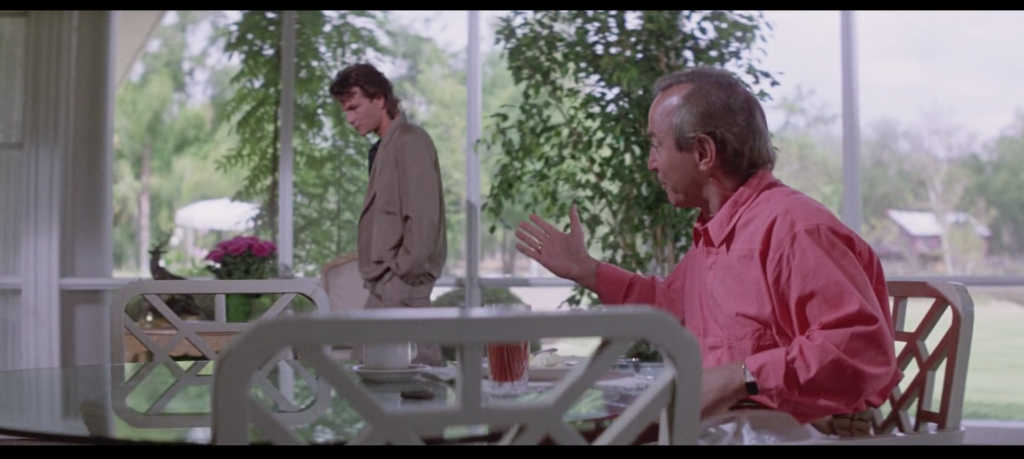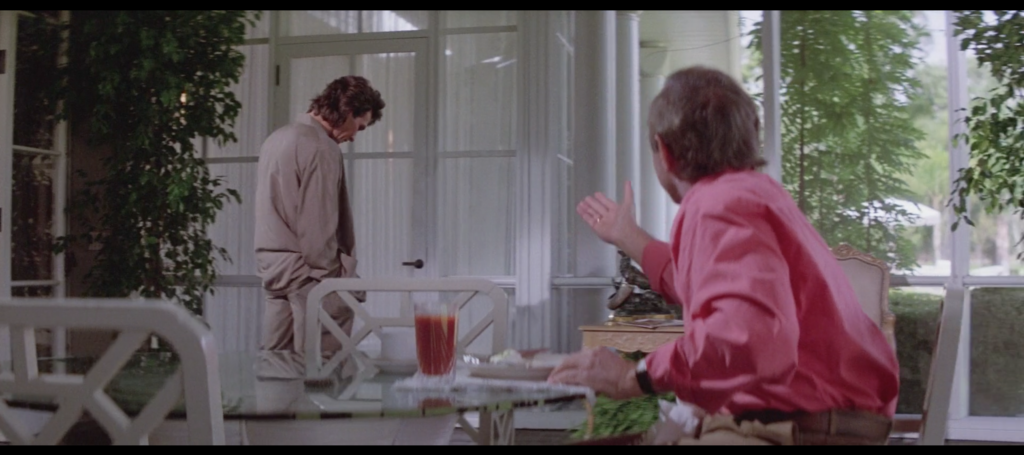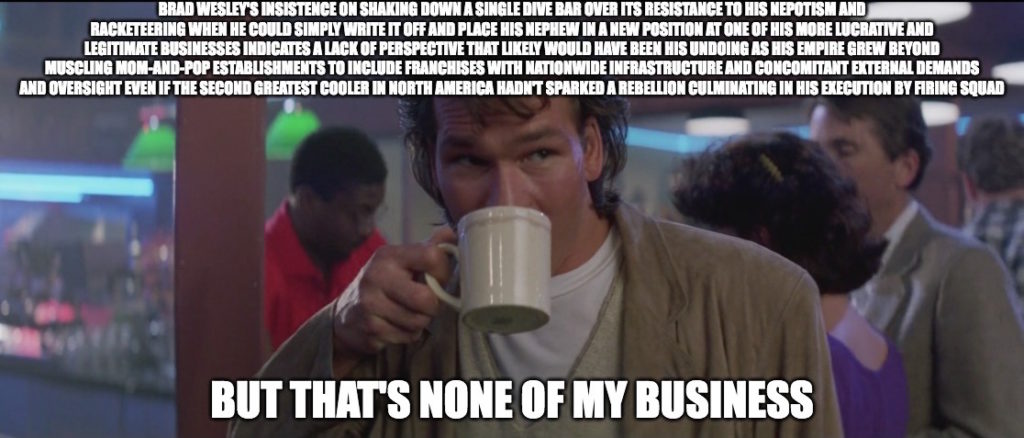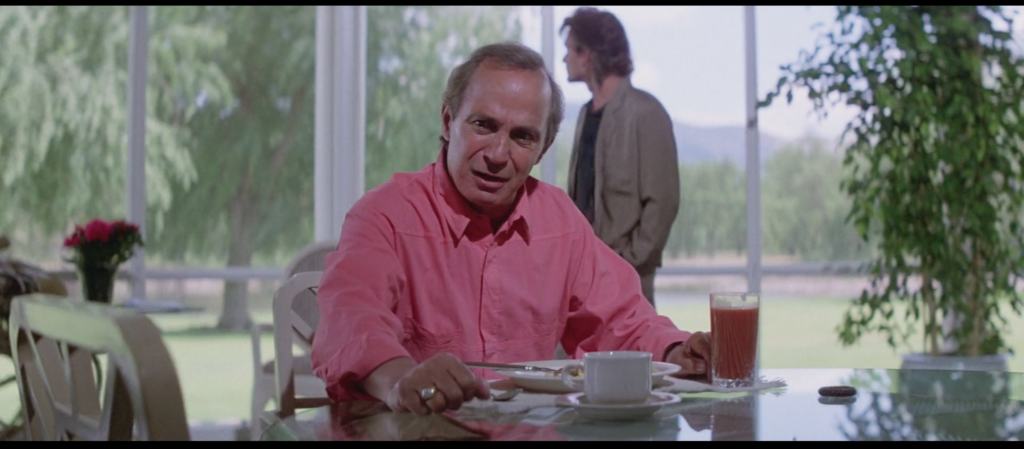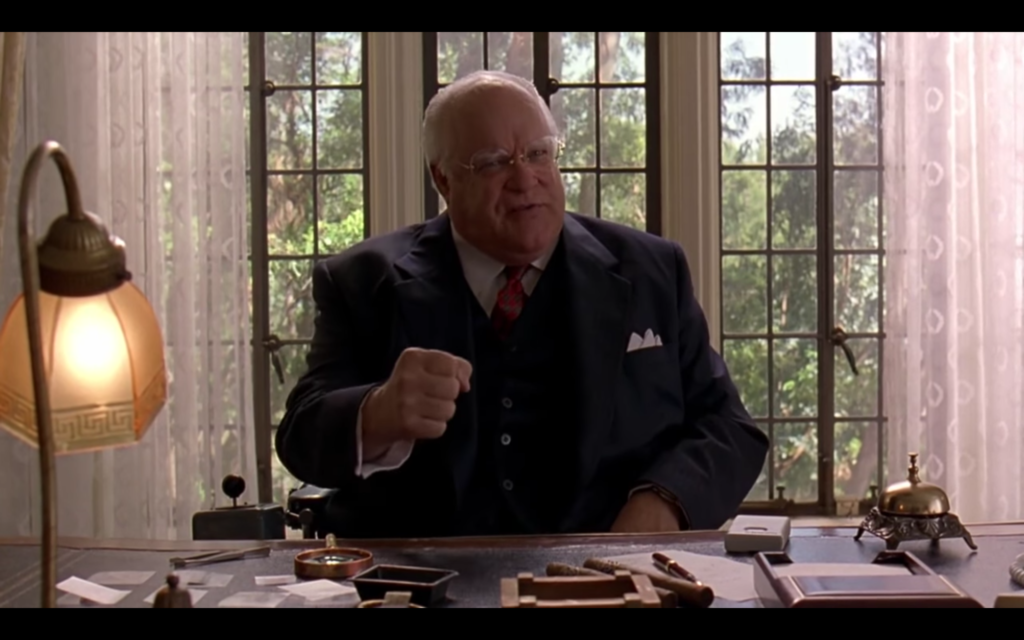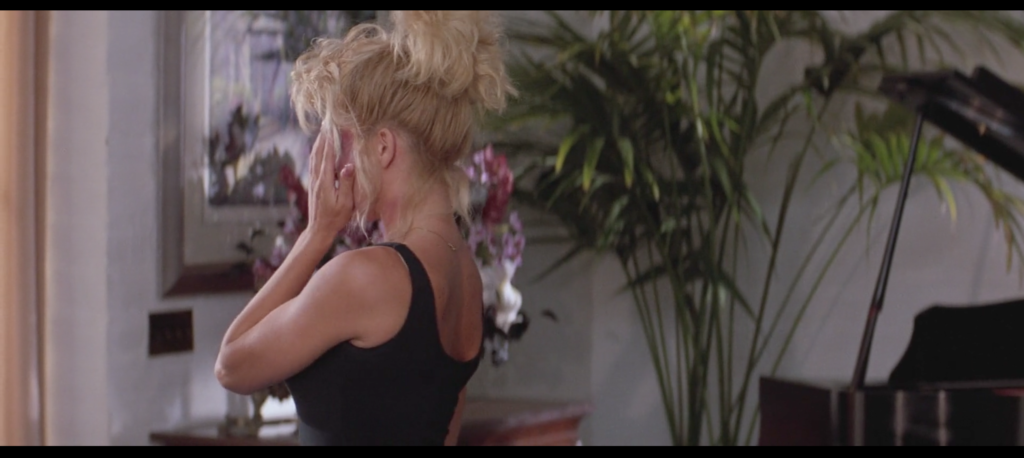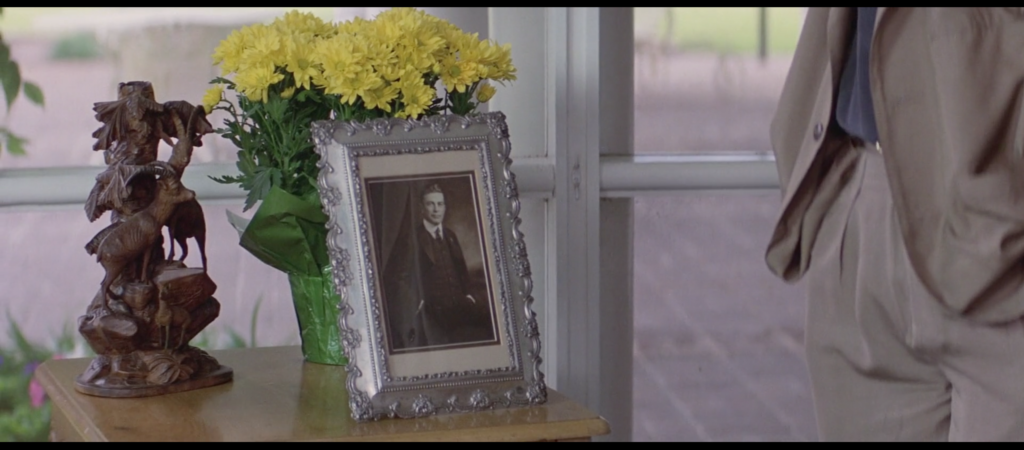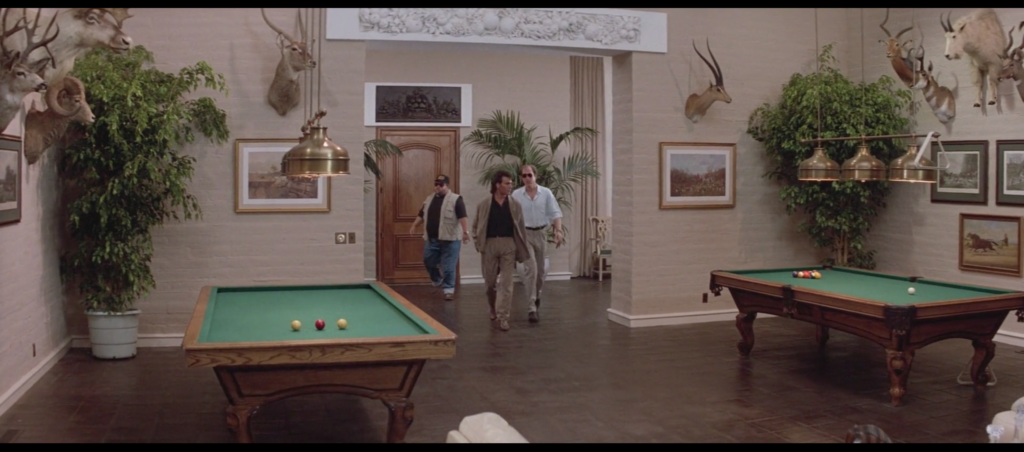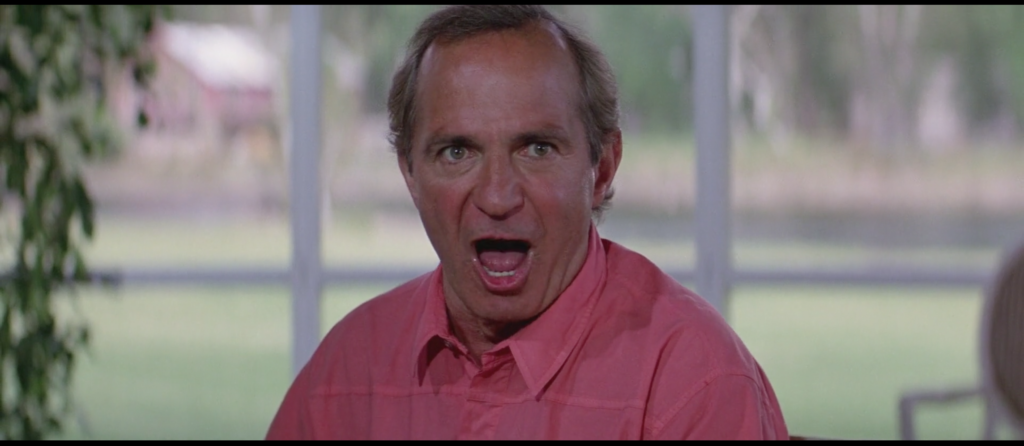From the opening montage to the closing scene, this is a tour de force episode of Dark. The everyday trials and tribulations of the adult and teenage characters are sexy and sad and often both. The Hannah/Ulrich/Katharina triangle of love, lust, friendship, and betrayal clicks in every respect. The beach scenes are funny and hot. The party is both sweet and, knowing what we know about the fates of everyone involved, brutal. Ben Frost’s music, particularly during the Martha/Jonas love scenes, is huge and rapturous, the way doomed young love feels.
And the meeting between Jonas and Michael is powerful and quietly crushing given its outcome. Actors Louis Hofmann, a truly extraordinary talent, and Sebastian Rudolph seem to pour themselves out all over the table where they sit and talk. What’s more, unlike the Ulrich/Mikkel material from the previous episode, the emotional impact of this father/son reunion isn’t hampered in the slightest by relying on sci-fi shenanigans to take place.
It feels like what it is: a son trying to save the man he loves most, a father trying to save the boy he loves most, and the both of them arriving at a decision over who must live and who must die. It takes the toughest decisions we must make as members of a family, as children and as parents, whether we’re ever actually forced to make them or whether they remain the stuff of troubling daydreams and what-ifs, and uses the science-fiction genre to probe that nerve as directly as possible. It does the same with falling in love, with the loss of virginity, with marital infidelity, with motherhood, with couplehood, with friendship. It’s reminiscent of “The Garveys at Their Best,” the standout episode from the first season of HBO’s The Leftovers—the episode that showed that series would become a classic. It’s dynamite. I’m glad it exists.
“Dark” thoughts, Season Two, Episode Six: “An Endless Cycle”
178. Phantasmagoria
“Cinema is a language. It can say things—big, abstract things. And I love that about it. I’m not always good with words. Some people are poets and have a beautiful way of saying things with words. But cinema is its own language. And with it you can say so many things, because you’ve got time and sequences. You’ve got dialogue. You’ve got music. You’ve got sound effects. You have so many tools. And you can express a feeling and a thought that can’t be conveyed any other way. It’s a magical medium. For me, it’s so beautiful to think about these pictures and sounds flowing together in time and in sequence, making something that can be done only through cinema. It’s not just words or music—it’s a whole range of elements coming together and making something that didn’t exist before. It’s telling stories. It’s devising a world, an experience, that people cannot have unless they see that film.” —from Catching the Big Fish by David Lynch
177. “You ask anybody, they’ll tell you!”
“Christ, JC Penney is coming here because of me!” gets all the attention, and for good reason. In Road House, the archvillain, a man who employs a small army of hired thugs to blow up buildings with recalcitrant old men in them, touts the arrival of The One-Day Sale—Storewide! as his greatest accomplishment. As my own summary goes, “Road House is the story of one bouncer’s quest to free a small town from the iron fist of the guy who is on the verge of opening the area’s first JC Penney. Over half a dozen men will die for this.” So I get it.
I prefer Casino to GoodFellas. Which is not to say I fail to recognize GoodFellas as Martin Scorsese’s masterpiece of mass entertainment, which I intend as a pure compliment. It’s the movie, not the kind of movie but the movie, that makes people fall in love with cinema. It’s like if the philosopher’s stone was rock candy. It’s a towering achievement. But I prefer Casino to GoodFellas because its interests are closer to my own. It’s grandiose, spectacular, it has a machine logic behind its narrative flow, it has pitiable characters and funny characters but no likeable characters, it’s brutally soul-crushingly violent, the music is maybe even cooler than the music in GoodFellas, it reads as a rejoinder to anyone who thought GoodFellas is about how much fun it is to be in the mafia, which may well have included Scorsese himself. It’s not the colossus GoodFellas is, but it stands taller in my heart.
I’m not sure if I’d go that far in describing the line that follows the JC Penney thing, which is “Ask anybody, they’ll tell you!” because let’s be honest, “Christ, JC Penney is coming here because of me” is the sound of my soul. But do not, do not sleep on that follow-up. Travel inside Brad Wesley’s mind and look out through his eyes at the town of Jasper, Missouri, and what will you see? A bustling hive of simple little people, buzzing with excited gratitude for what Brad Wesley has done for them, awed by its magnitude, eager to spread the good news. Brad Wesley envisions Dalton driving down the main drag, stopping in one of the town’s countless hole-in-the-wall bars and greasy spoons (Jasper is where Diners, Drive-Ins and Dives manifests Guy Fieri’s id as a tulpa), sidling up to one of the Four Car Salesmen, stopping people at the doors of the Double Deuce, grabbing any man jack off the street, chatting up any swinging dick he sees and getting the same response: “Oh, the JC Penney? It were Brad Wesley what done it.” Like Boromir or Samwise Gamgee contemplating a world in which the Ring gives them Command, Brad Wesley envisions the masses roiling with department-store ecstasy from sea to shining sea, his name rolling off their tongues like glossolalia. Children by the million sing for Brad Wesley bringing JC Penney to Jasper when he comes round. I’m in love. What’s that store? I’m in love with that store.
“Dark” thoughts, Season Two, Episode Five: “Lost and Found”
Adding an entire working theory of theology, theodicy, and the nature of the universe to, y’know, families in the German suburbs being torn apart by time travel, episode five of DarkSeason Two offers a lot to ponder, from plot to philosophy. It offers an eye-opening look at both the tactics and the worldview of Adam, the prime mover of Winden’s cross-generational “war” for control of time and the wormholes within it. Yet it muddies up some of the show’s more directly effective and affecting interpersonal elements.
“Too Old to Die Young” thoughts, Season One, Episode Five: “The Fool”
Let us sing the praises of James Urbaniak, whose dark energy in “The Fool,” the riveting fifth episode of Nicholas Winding Refn and Ed Brubaker’s currently peerless crime drama, is powerful enough to fuel the goddamn Death Star.
I reviewed episode five of Too Old to Die Young for Decider.
“Dark” thoughts, Season Two, Episode Four: “The Travelers”
“The Travelers” brings us to the halfway point of Dark‘s strong second season, and the music of composer Ben Frost is our company on the journey. An experimentalist whose musical and geographical travels have taken him far and wide, and who’s spent time working with venerable avant-rock superproducers Brian Eno and Steve Albini (just don’t call them superproducers to their faces), Frost’s work in this episode is a sanity-testing tide basin of shrieks and thrums and tones of alarm. It’s reminiscent of Brian Reitzell’s confrontational work on Bryan Fuller’s Hannibal, or the collaborative soundscape produced by Angelo Badalamenti, Dean Hurley, and David Lynch on Lynch and Mark Frost’s Twin Peaks: The Return. Not just sonically, either: Dark continues to make the case that it’s the best genre drama Netflix has put out yet. If it’s not on Hannibal‘s level, much less Twin Peaks‘s, it has no reason to be shy about standing in their company.
“Too Old to Die Young” thoughts, Season One, Episode Four: “The Tower”
The fourth installment of Nicholas Winding Refn and Ed Brubaker’s extended meditation on the evil that men do is one of the most unnerving episodes of television in recent memory. I’d put it up there with any highlight you’d care to name from The Terror, The Act, Channel Zero, The Assassination of Gianni Versace: American Crime Story, and even the gut-churning war-crime climax of Game of Thrones.
I reviewed episode four of Too Old to Die Young for Decider.
176. Human
“Oh Christ,” says Brad Wesley to Dalton, “you get paid for beating people up! Tell me you don’t love it. Of course you do! You wouldn’t be human if you didn’t!” It’s a revealing moment for two reasons. First, it’s the third time in this scene alone that Wesley has employed his favorite blasphemous expletive. I’m going to assume that “Ben, you said ‘Christ’ three times that take, do you think we can go again” was not going to cut any ice on that particular set, so there’s that, but recall which character spreads a gospel with a wound in his side. Second, Brad Wesley’s defining characteristic of humanity is the enjoyment of establishing dominance by inflicting pain, particularly in exchange for cash. This squares with everything we know about him: hiring goons to strong-arm the other weird old men who own businesses around town, beating his girlfriend, citing his survival of “Korea” and “the streets of Chicago” as the sole points of interest in his pre-Jasper biography, festooning his home with the stuffed corpses of literally dozens of different slain animals. (Trust me, you haven’t seen the half of it.) If Dalton needed any more evidence that this is a man who cannot be negotiated with, he has it now. But third, when you turn it around in your mind, you can see it as proof that he does care about his “boys,” the goons. If getting paid to beat people up is a way to do what you love and love what you do, if it proves your essential humanity, then what a gift he has bestowed upon Jimmy, Ketchum, Karpis, O’Connor, Tinker, Morgan, Mountain, and his sister-son Pat McGurn, all of whom he pays to beat people up. For Brad so loved the goons, that he gave his only begotten cash, that whosoever worketh for him should not perish, but have everlasting life.
“Dark” thoughts, Season Two, Episode Three: “Ghosts”
Time travel, kidnappings, cancer, nuclear apocalypse—yes, sure, all well and good. But for this review of Dark, I’d like to start out by showcasing some acting. That’s an advantage of having two or three different actors play every single character at different times in their lives, right? There’s a lot more acting to go around!
I don’t mean to make light of it, either. “Ghosts,” the third episode of the German Netflix drama’s second season, shows how important the cast is to making this crazy-on-paper project work. Following young, adult, and old versions of characters spread across a hundred-year timespan, often interacting with each other anachronistically and even starting whole new lives out of sync, is demanding work for the audience. Rooting that work in the happiness, sadness, and shame of the characters—making them people, not plot devices—is the secret of the show’s success.
“Too Old to Die Young” thoughts, Season One, Episode Three: “The Hermit”
Titled “The Hermit” after the corresponding card from the tarot (that’s where every episode gets its moniker), the third exquisite installment of Nicholas Winding Refn and Ed Brubaker’s Too Old to Die Young has only one thing wrong with it that I can see: It could have been longer.
I reviewed episode three of Too Old to Die Young for Decider.
175. “You bet your ass I have”
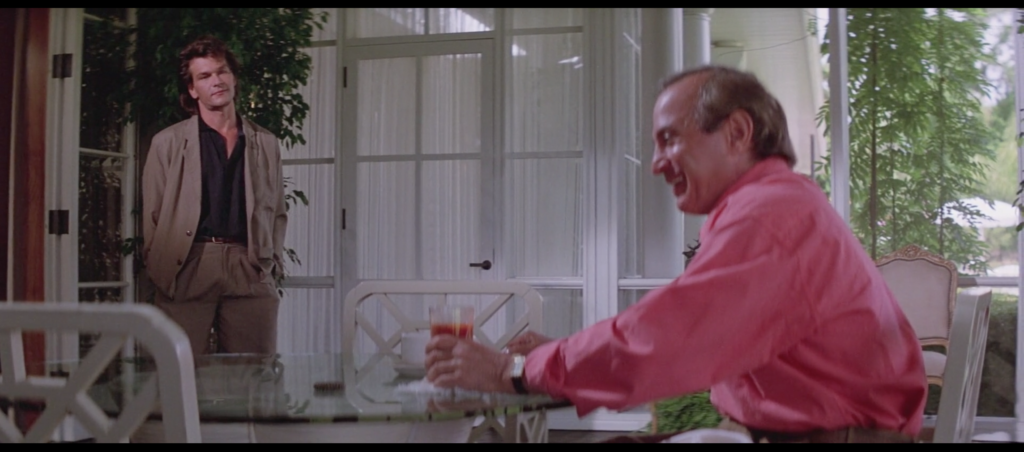 About the only time I find Brad Wesley appealing as a person, not just entertaining but “ha, this guy’s alright,” is when he laughs and admits he’s robbing the town of Jasper blind. By now you know his litany of achievement: In the name of the 7-Eleven, the Fotomat, and the JC Penney, Amen. After he runs through the catechism, Dalton observes that he’s gotten rich off the locals, intending it to be a charge of parasitism delivered as a balls-and-strikes observation. Wesley doesn’t give half a shit how Dalton intended it, since it’s true, and he can afford to admit it. He grins and chuckles and says in Ben Gazzara’s bullfrog rumble “You bet your ass I have.” He goes on from there, announcing he’s going to get richer, that acquisitive wealth is his destiny, that he’s gathering unto him—he says “gather unto me” in so many words, amazingly—what is his. But that’s the whip cream and the sprinkles and the hot fudge and the maraschino cherry on top. The real banana split of the thing here is straight-up laughing at a guy’s attempt to own him for making money by taking it from other people and going “yeah, and?” You don’t need to admire what he’s doing to appreciate the well-deserved self-confidence with which he’s doing it. I hear Dalton’s braggadocio when he talks to his assembled bouncers about how it’s his way or the high way, with none of the “well gee I suspect it’s always been that way, when a feller earns hisself a degree from NYU and needs to make a livin'” faux humility he serves up elsewhere. I hear my talented and brilliant friends when they’re like “Fuck off, I’m talented and brilliant and deserve to be recognized as such,” one of my favorite things that any of my talented and brilliant friends ever do. They are, and they do, and others should indeed fuck off. Unfortunately for all concerned Brad Wesley isn’t a TV critic or a cartoonist, he’s a gangster who’s willing to lie, steal, and even kill if it means Jasper gets a Sam Goody. But in this way, and possibly only this way, I like the cut of the man’s jib. Alright, this way and the way in which he swerves all over the road while singing “Sh-Boom.” Those two ways.
About the only time I find Brad Wesley appealing as a person, not just entertaining but “ha, this guy’s alright,” is when he laughs and admits he’s robbing the town of Jasper blind. By now you know his litany of achievement: In the name of the 7-Eleven, the Fotomat, and the JC Penney, Amen. After he runs through the catechism, Dalton observes that he’s gotten rich off the locals, intending it to be a charge of parasitism delivered as a balls-and-strikes observation. Wesley doesn’t give half a shit how Dalton intended it, since it’s true, and he can afford to admit it. He grins and chuckles and says in Ben Gazzara’s bullfrog rumble “You bet your ass I have.” He goes on from there, announcing he’s going to get richer, that acquisitive wealth is his destiny, that he’s gathering unto him—he says “gather unto me” in so many words, amazingly—what is his. But that’s the whip cream and the sprinkles and the hot fudge and the maraschino cherry on top. The real banana split of the thing here is straight-up laughing at a guy’s attempt to own him for making money by taking it from other people and going “yeah, and?” You don’t need to admire what he’s doing to appreciate the well-deserved self-confidence with which he’s doing it. I hear Dalton’s braggadocio when he talks to his assembled bouncers about how it’s his way or the high way, with none of the “well gee I suspect it’s always been that way, when a feller earns hisself a degree from NYU and needs to make a livin'” faux humility he serves up elsewhere. I hear my talented and brilliant friends when they’re like “Fuck off, I’m talented and brilliant and deserve to be recognized as such,” one of my favorite things that any of my talented and brilliant friends ever do. They are, and they do, and others should indeed fuck off. Unfortunately for all concerned Brad Wesley isn’t a TV critic or a cartoonist, he’s a gangster who’s willing to lie, steal, and even kill if it means Jasper gets a Sam Goody. But in this way, and possibly only this way, I like the cut of the man’s jib. Alright, this way and the way in which he swerves all over the road while singing “Sh-Boom.” Those two ways.
174. Ozymandias
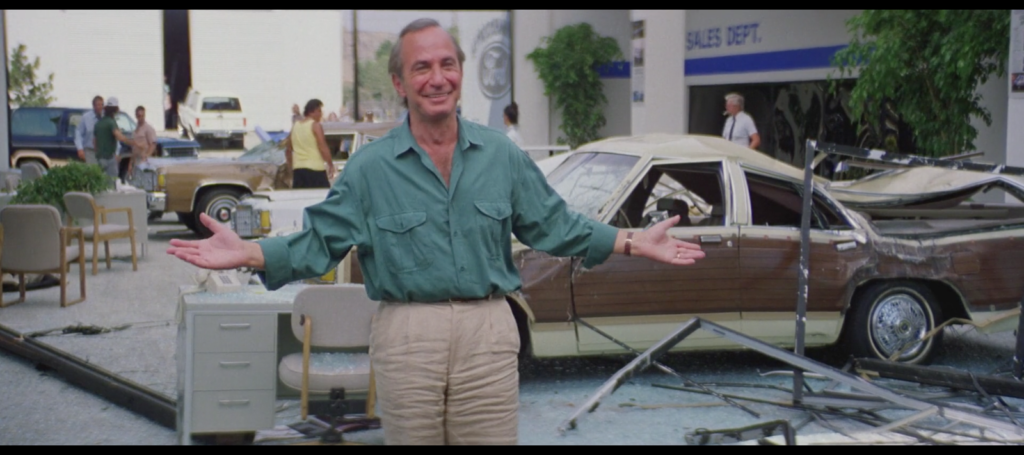
I met a traveller from an antique land,
Who said—“Two vast and trunkless legs of stone
Stand in the desert. . . . Near them, on the sand,
Half sunk a shattered visage lies, whose frown,
And wrinkled lip, and sneer of cold command,
Tell that its sculptor well those passions read
Which yet survive, stamped on these lifeless things,
The hand that mocked them, and the heart that fed;
And on the pedestal, these words appear:
‘I brought the mall here, I got the 7-Eleven, I got the Fotomat here;
Christ, JC Penney is coming here because of me! You ask anybody, they’ll tell you!’
Nothing beside remains. Round the decay
Of that colossal Wreck, boundless and bare
The lone and level sands stretch far away.”

“Dark” thoughts, Season Two, Episode Two: “Dark Matter”
As always, getting through the raw plot of the show takes up a lot of column inches. But don’t let it take up all the storage space your brain has allotted for the show. While the family tree is a maze of brambles and the timelines look like the tangle of wires connecting your TV to your Xbox, the emotions are recognizable and real. Feeling like you don’t really know the people who are supposed to love you; feeling like you’re trapped in a great cosmic fuck-up and the only way to be happy is to try to just ignore it; feeling powerless to stop oncoming tragedies both great and small—that’s the stuff this show is working with, the stuff it really cares about. It’s dark matter indeed.
I reviewed episode two of Dark Season Two for Decider.
“Dark” thoughts, Season Two, Episode One: “Beginnings and Endings”
Easily one of the most thematically ambitious dramas Netflix has produced (in any language), and certainly the most narratively complicated one, Dark has returned after a year and a half for a second season of sci-fi and sadness in the woody suburbs of Germany. It does so without making the slightest concession to the notion of jumping-on points for viewers coming to the second season fresh. This is not that kind of show. If you want to get the most out of Dark—if you want to get anything out of Dark—you’d better start from the beginning. This is a journey you have to follow every step of the way.
(NB: Descriptions in these link posts will be minimal due to me playing catch-up. I guess you’ll just have to go read the reviews!)
172. Lebowski (III): Korea
Brad Wesley may bear a closer to resemblance to a very different captain of a very different industry from The Big Lewbowski, but in recasting the Korean War as a crucible for personal growth rather than the grotesque slaughter of a country by warring empires he has more in common with Jeffrey Lebowski than with Jackie Treehorn. (As far as we know, anyway; it’s entirely possible Jackie Treehorn froze his dick off in early 1951, leading to his belief that the brain is the biggest erogenous zone.)
When Wesley came to Jasper after Korea, he tells Dalton, there was nothing. His ambition stems, then, from a kind of horror vacui; this would account for his work in the area as a developer, entrepreneur, and establisher of the area’s first Slurpee machine, and it may stem from his experience with privation during that grim time overseas. For the Big Lebowski, Korea afforded him the chance to tell a non-sob-story sob story, about how a gentleman from the People’s Republic cost him his legs, but excuse me sir, spare me the pity and hold back the handouts, everything he’s done since is a testament to his indomitable will to achieve, legs or no.
In both cases the Korean Character-Building Exercise did precisely nothing to make either of these men worth more than a pisshole in a snowbank. Lebowski married into money, and his avant-garde artist daughter Maude allows him the fig leaf of a charitable foundation and a trophy wife to keep him from blowing her late mother’s fortune. Wesley built a mall and some strip-mall stores and hires semi-competent legbreakers to bust up auto-repair shops and dive bars to keep the locals in line. Both men wind up lying on the floor of their own palatial homes in humiliation and defeat by the end of their respective films, though Lebowski at least is still a going concern afterwards, which is more than we can say for Jasper’s JC Penney baron. The paths of glory lead but to Frank Tilghman’s shotgun and Walter Sobchak’s misdiagnosis of paraplegia.
“Too Old to Die Young” thoughts, Season One, Episode Two: “The Lovers”
Murder? Yes. Illicit sex? You bet. Gross rich criminal father figure? Mmhm. Hot monochromatic and duochromatic lighting? Oh, indeed. Tracking shots and camera pans so slow they should be measured by half-life? Absolutely. Yes, most of what characterized the first episode of Too Old to Die Young shows up in the show’s second outing as well. With one major exception: the main character.
171. The difference
I love Road House, I really do. I don’t think that could be any more obvious at this point. But there’s a difference between a movie like Road House and a movie we’d traditionally describe as a great movie. “Famous bouncer” is a difference. “Four different car/car parts salesmen” is a difference. “Major antagonists killed off-screen” is a difference. “Does a hobbyhorse have a wooden dick” is a difference.
But the biggest difference, the difference that matters, is this: In a great movie, the shot of Denise putting her hand to her face to hide her bruises from her abuser’s employees and enemy would be a cornerstone, not a throwaway.
170. Grandpa Wesley
At least I assume it’s Grandpa Wesley; it’s hard to imagine Brad Wesley celebrating his matrilineal anything, even his kindly Pep-Pep. What’s for certain is that the black and white portrait on a table in his breakfast room (at least I assume it’s his breakfast room; a man of Wesley’s pretensions to feudalism almost certainly has a long oak table with high-backed chairs somewhere around that hideous house) is a portrait of his grandfather, as he announces without looking up from his breakfast when Dalton pauses in front of it.
“Looks like an important man,” Dalton says.
“He was an asshole,” Wesley replies.
This is one of my favorite stupid exchanges in the movie for a variety of reasons. Judging from the not just conciliatory but outright deferential tone Dalton adopts when he proclaims Grandfather’s importance—the “looks like” is just a turn of phrase, you can hear in his voice he’s quite certain it must be so—it’s quite possible that this was the last opportunity for peace in our time between the two most lethal men in Jasper, Missouri.
Despite enduring multiple physical assaults and murder attempts, despite seeing what Brad Wesley does to the woman in his life, this is Dalton attempting to meet Wesley where he lives, no longer just literally but emotionally as well. Surely, surely he can get this crazy old bastard to wax nostalgic about the lessons Papaw taught him, tough but fair no doubt, thunder in his voice but warmth in his heart, taught me the value of a dollar, when you forgive your enemies you create friends, you and me Dalton we’re not so very different are we?, you can hear it all play out in your mind just as clearly as Dalton could. Who would expect Wesley to grab hold of the proffered conversational life preserver long enough only to stick his ass into the middle and use it as a makeshift floating toilet before sending it bobbing on back? Not even the second greatest cooler in North America, I’ll wager.
Which is why I believe this to be one of the few occasions in which Dalton’s cooler-sense fails him.
Consider: His powers of observation, of sight and sound, of the sixth sense that can tell when trouble has walked through your door in knife-augmented boots, are unmatched at this point in the film.
Then consider: Here is the room he walked through in order to reach Brad Wesley.
What about this picture suggests to you that Brad Wesley uses the dead for decoration because he misses the time when they were alive?
169. No Country for Poptimism
“Will you shut that shit off?!” Brad Wesley yells. The “you” is unidentified, although Tinker and O’Connor snap to and head in the direction of the source of the problem. The problem is the upbeat ’80s dance-pop Wesley’s abused girlfriend Denise is blasting while she exercises, which she does with Fondaesque brio despite the bruises covering her face, neck, and chest, and the ensuing shame that causes her to cover up when Dalton sees. The source of the problem is therefore Denise, who’s playing the music in the first place. “I can’t listen to that crap,” Wesley explains to Dalton as his goons force his girlfriend to turn the brisk, bright, twitterpated tune off. “It’s got no heart!” Or balls, if you prefer, since that’s the body part to which Wesley later refers when he orders a command performance from Cody at the Double Deuce. During that performance, Denise is prompted to get on stage and strip, which she does with talent and enthusiasm. Then it’s Dalton’s turn to complain about Denise’s homage to Euterpe and Terpsichore. He refers to her as a dog who should be kept on a leash.
To the characteristically awful Wesley and the uncharacteristically mean-spirited Dalton, there’s nothing more aggravating than a woman enjoying art on anything approaching her own terms, even if it’s while working out to shake off the beating she received the night before, even if it’s taking off her clothes in front of a room full of baying strangers not for her own sake or her own financial health but to aid her abuser in his weird power trip. Music that lacks roots-rock authenticity, dancing that sexualizes the woman dancing with insufficient deference to the concerns of the man watching—these grave injustices must be stopped.
If Brad Wesley and James Dalton weren’t locked in a life-and-death struggle over a bar, they’d write one hell of a Black Mirror episode.

